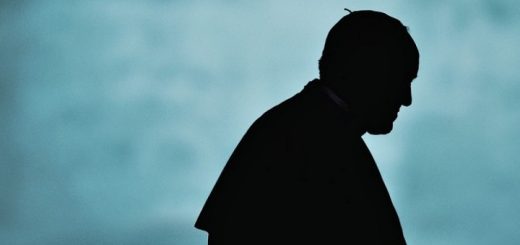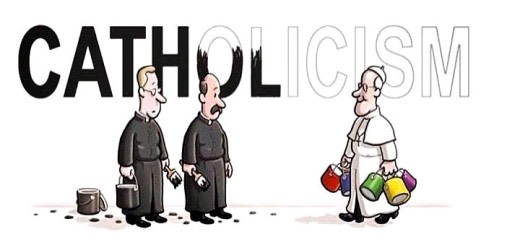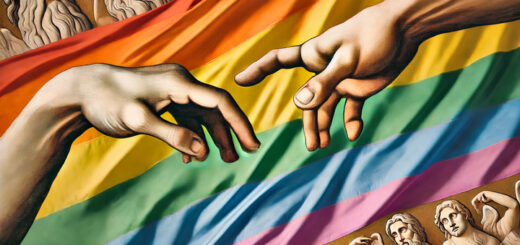The moral theologian Maurizio Faggioni: reread the paradigm of Christian sexuality
Interview by Luciano Moia to Father Maurizio Faggioni published on the future of 19 February 2019
Church and homosexuality, a slow, tiring approach. From the convictions of Pius V (1504-1572), with the sadly known bubble in which the "sodomites" were accused of being more or less the evil of the world, to the welcome of our days when, "There is the attempt to watch without prejudice an existential conturbing situation for Christian sensitivity, but which would be unfair to judge a priori absolutely unable to invest human and Christian values», Notes Father Maurizio Faggioni, moral theologian, doctor and bioethasticist, author of numerous studies on the topic.
"The opening for a positive welcome of homosexual people and their qualities, and of enhancement of aspects of a homosexual relationship have aroused understandable perplexity and reserves during the discussions of the double Synod on the 2014-2015 family. Amoris Laetitia, in the end, reiterates the previous magisterium, however, underlining important aspects such as the dignity of each person "regardless of sexual orientation", the commitment to avoid "every brand of unjust discrimination" and "any form of aggression and violence", the insurance of respectful accompaniment to families "so that those who manifest the homosexual tendency can have the necessary aid to understand and fully realize the will of God in their lives»(At. 250).
Have there been more significant openings during the debate and in other Synod documents?
Compared to the final report, the report after the discussion presented as the synthesis of the works of the first week of the extraordinary Synod of 2014, had a more bold pastoral breath and was proposed to move in a line of continuity, but also of study compared to the previous magisterium.
The post-conciliar magisterium has abandoned the punitive tones of tradition, considered the homosexual orientation itself in itself guilty, claimed the dignity and rights of homosexual people as people and children of God. The relationship after the discussion proposed to enhance the role of homosexual people in the Christian community and sought to grasp the positive elements that can contain a homo-effective relationship.
And what elements did it highlight?
At n. 50 stated that "homosexual people have qualities and quality to offer to the Christian community" and wondered: "Are we able to welcome these people, guaranteeing them a space of fraternity in our communities? Often they want to meet a church that is a welcoming house for them. Are our communities able to be accepting and evaluating their sexual orientation without compromising Catholic doctrine on family and marriage? ».
However, we were stopped at a series of questions
The Synod intercepted questions that emerge from some local churches and bravely accepted the challenge, but with great prudence because the Christian understanding of love and sexuality is at stake here. The same report, in the following two points (51e52), drew the consequences of this perspective by explaining that: "The homosexual question appeals to us in a serious reflection on how to develop realistic paths of emotional growth and human and evangelical maturity" and finally gave a voice, to a very innovative opening: "without denying the moral problems connected to the homosexual unions, there are cases in which there are cases. Mutual support up to the sacrifice constitutes a precious support for the life of the partners "(n. 52).
In short, was it said that homosexual love is also worthy of being valued in a Christian perspective?
We could say so. It would be difficult - although I can understand - to support the reconciliation of a homogenital practice with the paradigm of anthropology and Catholic sexual ethics, but it would be unfair not to appreciate as far as good a relationship supported by a homosexual affection could sometimes express. If two people, within the intense friendly relationship and reason of this relationship, come to implement humanly significant values, such as loyalty, sharing, tenderness, listening, help, service to sacrifice, how is it possible to deny that that relationship, despite everything, can produce, by grace of God, of the good?
Is this today the position of moral theology? At least of the one who is painstakingly looking for a balance between tradition and innovation?
The Church that confronts this and with other burning issues today needs truth and mercy, dialogue and wisdom, keeping the gaze on the ideal that reflects the glory of the animation, without forgetting that the lightning of the light was hidden in the Kenosis of the incarnation. In a part of theology there are escapes forward towards moral positions that sound too dissonant with respect to the Christian anthropological ideal, but the debate deserves to be faced in any case. An unavoidable question is whether they are possible reinterpretations and insights of the traditional Catholic positions such that allow to remain faithful to the paradigm of Christian sexual ethics, but, at the same time, they open to forms of integration and enhancement of sexuality, so to speak "alternative" that are more or less different from the ideal.
However, it remains a great attention not to make confusion between sacramental marriage between man and woman, and other types of union.
Here also Amoris Laetitia places an unsurpassed barrier when he says that "There is no foundation to assimilate or establish analogies, not even remote, between homosexual unions and God's design on marriage and family". The vision of marital love of the Catholic magisterium - which I fully agree and which I consider a gift for all humanity - leads us to exclude constraints of nature even just analogically marriage between homosexual people. It seems to me, however, reasonable to keep a more ductile position towards some rights of people who live a deep and lasting existential bond.
There are situations such as, for example, a medical decision for a patient without knowledge, in which the word of a homosexual companion can be more expressive than the will of the subject than that of a consanguineo. There are assets that must be regulated with equity, such as the legacy of a house purchased with the common efforts of a homosexual couple or as the reversibility of the pension for a partner who has taken care of the companion/infirm for years. In short, it could be appropriate for the social order and justice to recognize some legal relevance to the stable homosexual couple, even if this cannot lead to the so -called homosexual marriage or the homosexual equivalent of the wedding, nor should it be done at the expense of the natural family.
The adoption for homosexual couples also remains unacceptable for Catholic anthropology. What are the foundations that prevent you from considering this possibility?
The lack of fertility of the homosexual relationship is a consequence of the lack of sexual difference. It is a sign, on closer inspection, of the radical incompleteness of the homosexual couple compared to the marital couple. In the heterosexual couple, the physical impossibility of generating has a different meaning than in the homosexual couple because, even if marital love cannot concretely incarnate in the child for some accidental obstacle, however it maintains its opening to welcome life: the adoption of the child allows the sterile couple to express the intrinsic fruitfulness of his love as a ability to welcome a new life. In the homosexual couple, however, the opening to life is not anticipated which is intrinsic to marital love.
For this reason it is feared that a child possibly adopted - as in some legislations - is not allowed - does not find in the homosexual couple the anthropological context that he needs for a harmonious and healthy psycho -infrequent development. The theme is very controversial both for the non -uniqueness and incompleteness of empirical data collected so far and for the setting of the problem that has now spread in the secular legal culture that tends to privilege more the right of adults to adopt that not the best interest of the minor.
But today, however, there are homogenitorial couples present in our communities. They ask for the sacraments for their children, they ask to be enhanced for what they can offer. Difficult not to face the problem.
The possibility of adoption in some countries and the presence of children entrusted to homosexual couples raises delicate psychological and pastoral problems that the Church must face courage and wisdom. On the one hand we cannot equate the homosexual couple to the married couple, on the other hand the Church feels the duty of care and welcome to these little ones. Today we are talking about how to welcome the children of homogenitorial couples, we ask ourselves about new theological paradigms.
When did the first signs of Disgeel began after the closures of the past centuries?
The post-conciliar magisterium has intervened several times on the theme of homosexuality without detaching itself, from the point of view of objective judgment, from the negative attitude of tradition, but taking into account both the data from the human sciences, and the theological reflection and a general attitude of respect towards people and their stories. The distinction introduced between homogenital acts and homosexual orientation is important.
The homogenital acts, by anyone who is placed and in any context, continue to be judged unacceptable for the Catholic morality which has as a model the Sponsal Man-Donna relationship. The homosexual orientation, however, although disordered with respect to the heterosexual paradigm, cannot be judged as guilty: there is a wide consensus, in fact, that the homosexual orientation does not derive from a choice and not even from a habit consequent to the repetition of homogenital acts, but is deeply rooted in the person since first years of life, if not, to some extent, before the birth. Being homosexual, in short, is not a sin, even if the homosexual orientation affects sexual acts that do not comply with the Christian ethical ideal. The acquittal from the moral responsibility of the homosexual condition does not resolve, however, the question of the emotional and sexual life of homosexuals that are seen precluded any possibility of legitimate sexual intimacy and which are therefore invited to perpetual continence.
Is this destined to remain an unsurpassed point or different spiragli open by some theologians will end up modifying this moral norm?
In the Christian vision sexuality is the language of communion and opening to otherness. To constitute a totalizing relationship such as marriage, however, it is not enough, simply opening up to another person, regardless of his sex, as in the friendly relationship. In front of a man, only a woman can constitute full otherness and vice versa.
Here lies the intrinsic limit of the homosexual relationship: in the homosexual relationship the person does not come out and cannot leave the circle of the self to self-enter and meet the other-from-Sé which is also another sexual. Obviously, it is not enough to be heterosexual to automatically achieve a total communion with the other spouse, but the homosexual relationship is missing the very possibility of becoming fully spousal, so that even the most intense and significant homosexual relationship remains imperfect compared to the ideal of the marital couple. In this context, the sexual union, not being able to express a spousal communion, total and mutual, presents itself unsurpassed as an ambiguous language.






